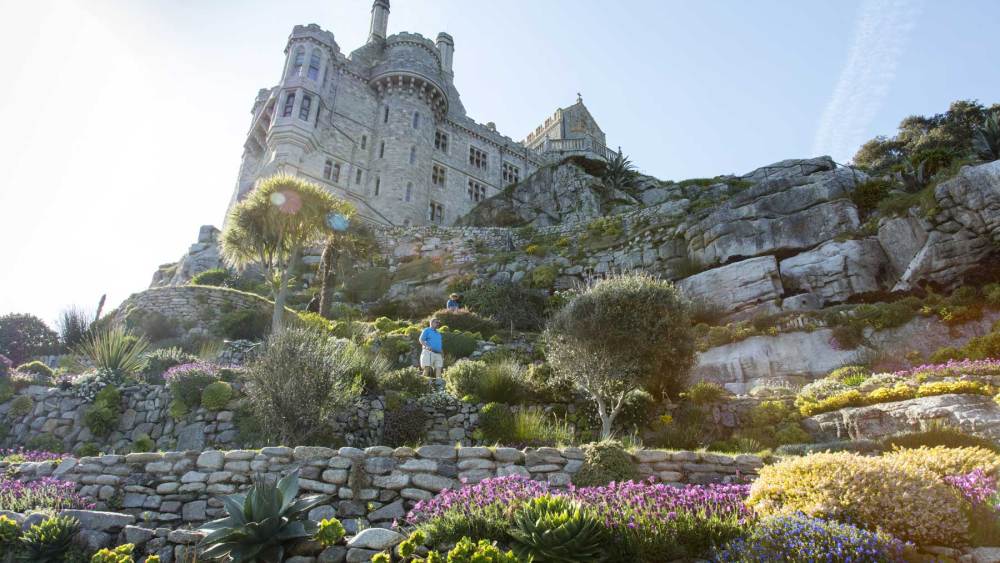Set-jetting, travel envy, celebrity worship — whatever the definition or the motivation for trekking to locales that you have only eyed in movies, streaming series or music videos, it’s increasingly popular.
Instead of scouting “the world’s best beaches” online, quizzing friends about favorite vacations or turning to a travel agent for recommendations, thousands are flocking to the locations where their favorite shows or films were shot.
It all adds up considering that people spend six hours and 40 minutes on screens each day globally — and in the U.S., the average screen time intake is upward of seven hours.
Travelers are increasingly choosing destinations based on streaming shows and movies versus Instagram and TikTok, according to Christie Hudson, a travel specialist at Expedia.
You May Also Like
Residents of Cornwall have been aware of the trend for a while, thanks to fans of “House of the Dragon,” “Poldark” and PBS’ “Doc Martin.” Enterprising businesses are offering themed tours and certain accommodations are touting their proximity to film locations to woo guests. Some of the telltale signs of the trend are all of the sub-age 30 and sub-age 40 out-of-towners milling around St. Michael’s Mount, according to Visit Cornwall’s executive chair Malcolm Bell. In past years, most travelers were more in the 50 and up age range. Holywell Bay and Kynance Cove are two other favorite stops with “House of the Dragon” fans.
Cornwall can sustain the current levels of interest, and the wave is welcome since area businesses are benefiting too. The free publicity generated by popular shows not only spares tourist boards from bankrolling advertising and marketing campaigns, but also offers “less edited views” of these respective locations, Bell says. “The tourist boards will always show off the bits and pieces that they want to show off, whereas TV and film is pleasing because it’s less edited,” he contends.
HBO’s first season of “White Lotus” drove visitors to Hawaii and season two sent many to Sicily, Italy, with Expedia searches for those locales increasing upward of 300 percent. And “Ted Lasso” has motivated some to venture to Richmond, a London suburb. Another unexpected choice for the airborne is Chicago, which many binge watchers of FX’s “The Bear” have gravitated toward, according to Hudson. Netflix’s international release of “Maxton Hall: The World Between Us,” boosted Expedia searches for Hanover, Germany, by more than 400 percent, and “Bridgerton” continues to spark interest in Bath and Windsor in the U.K., Hudson added.

What’s newer now is how quickly the tourism industry is jumping in on the trend via services like foodie tours in Chicago inspired by “The Bear,” including a three-and-a-half hour bus tour called “Yes: Chef!” There are also walking tours in Paris inspired by Netflix’s “Emily in Paris,” where companies like Fat Tire Tours lead fans past Emily’s fictitious apartment near Estrapade Square, as well as stops by her office and other filming locations, such as the Jardin du Palais Royal.
Looking ahead, Hudson says that interest in trips to Thailand is expected to increase once the third season of “White Lotus,” which is reportedly being filmed in and around Koh Samui, Phuket, and Bangkok, is released. Ditto for Malta, which is the setting for the “Gladiator 2” film and scenes in “Mission Impossible: 2,” Hudson says. And travelers’ interest the Scottish Highlands is expected to bump up once the eighth and final season of “Outlander” is available.

The Edinburgh, Scotland-based tour operator Absolute Escapes tapped into consumers’ interest in the show last year by highlighting the top 10 “Outlander” filming locations including the 14th-century Doune Castle and Linlithgow Palace, which was the birthplace of both James V and Mary Queen of Scots. While history buffs can glean more facts from such stops, many entertainment-driven travelers are in search of the sites of their favorite shows to share on social media. While some may search for potential trips as they watch their favorite series, booking trips to those places is not as reactionary. That might require more time for planning, due to how far away their preferred location might be and how expensive such vacations might cost, according to Hudson.
“I don’t think this trend is going anywhere. Every year we do a temperature check to see if it’s waning or getting more popular. With the way that we consume media and with streaming services giving us this bingeing behavior, it’s so easy to become immersed in the destination or the setting of a show. The next natural step is to ask, ‘How do I get more of being in that world through travel?’” Hudson says.
Despite all the buzz for entertainment-driven travel, the concept is far from new. Consider Salzburg, Austria, which has attracted generations of visitors that have flocked to the area after seeing the 1965 film “The Sound of Music.” Some stay at the Hotel Schloss Leopoldskron, a Rococo palace where many scenes were filmed. Others take the “Original Sound of Music tour,” a four-hour excursion that includes stops at other film locations like the Nonnberg Abbey and the Mirabell Garden. Super fans can also learn to make crisp apple strudel at the Edelweiss Cooking School, which is located in a cave in Old Town. Sing-alongers know that the pastry is referenced in Julie Andrews’ version of the Rodgers and Hammerstein song “My Favorite Things.” The school’s Selen Özgür says, “Of course ‘The Sound of Music’ has a big influence on our business. We are currently mostly sold out weeks in advance, due to the popularity of our destination.”

Salzburg’s proximity to Munich and Vienna, as well as its annual classical music festival and ties to Mozart, are factors too. “But most of our guests who are visiting us from the States are actually in town to see ‘The Sound of Music’ filming locations. That is definitely a fact,” Özgür says.
With next year being the 60th anniversary of the film’s release, plans are being made to unveil a “Sound of Music” Museum in the summer of 2026 at Hellbrunn. Although Salzburg’s staying power is undeniable in terms of tourism, the waves of entertainment travelers tend to flood and recede in other places. While Stiegg Larsson’s “The Girl With the Dragon Tattoo” and the Danish thriller series “Borgen” bolstered “Nordic Noir-”inspired trips, the current interest in Nordic Noir among tourists is “relatively modest,” according to Clara Fugsland Sogaard of Wonderful Copenhagen. Despite that, Nordic Noir tours and train travel are still offered.
Camilla Swartz, a cofounder of Landfolk, which rents 2,500-plus holiday homes in Denmark, Norway, Sweden and Germany, says guests get their inspiration from popular culture such as movies, TV shows and books, based on a survey earlier this year. The company is “definitely dreaming about opening another new market this year,” with holiday homes in the warm south of Europe on its radar, she says. Landfolk was started three years ago by seven former Airbnb employees.
With over-tourism an increasing concern in not just major cities like Venice, Barcelona and Amsterdam, but also Mallorca, Spain; Cinque Terre, Italy; the islands of Hawaii, and Bali, the entertainment-driven travel trend is encouraging even more visitors to catch flights. To try to curb their crowded streets, some governmental officials adopt tourist taxes and caps. Counter to set-jetting, a Netflix star, the Nepalese-born Lhaka Sherpa, whose record-climbing 10 ascents of Mount Everest is the subject of “Mountain Queen: The Summits of Lhaka Sherpa,” lamented in a recent interview how Nepal has become “like a highway,” due to all of the travelers and climbers.
Taking a different tack earlier this year, Visit Copenhagen created the reward-driven system called “CopenPay,” where travelers could earn museum admissions and other incentives to Copenhagen attractions for climate-friendly actions. The program is now being re-evaluated until next year.
Just as some officials are keeping a watchful eye on any uptick in tourism so, too, is the United Nations Educational, Scientific and Cultural Organization that identifies World Heritage Sites, places and monuments with artistic or timeless significance. Occasionally they are featured in films or streaming series, as will be the case this fall when Netflix will debut “Territory,” which was partially filmed in Kakadu National Park — a UNESCO World Heritage site in the Australian Outback. Although UNESCO has not addressed the set-jetting trend head-on, the organization does offer guidelines for sustainable tourism in order to manage sites better by offering periodic assessments of tourism to create a baseline for better planning, strategies and policies that might be needed, according to Peter Debrine, who leads UNESCO’s sustainable travel program.
How pop culture’s influence is making filming locations a must-see for a quick selfie versus actually learning about the historical sites raises another question. Set-jetting’s potential impact on visitors’ interest in learning about or participating in the hundreds of festivals, artisanal practices and other cultural practices and expressions that UNESCO has chosen for its Intangible Cultural Heritage also remains to be seen. However, another travel trend — duping, as in visiting an alternative destination that is less crowded and often more affordable compared to the more well-known local could be welcome news, Debrine says. That could potentially help offset set-jetting and over tourism.



